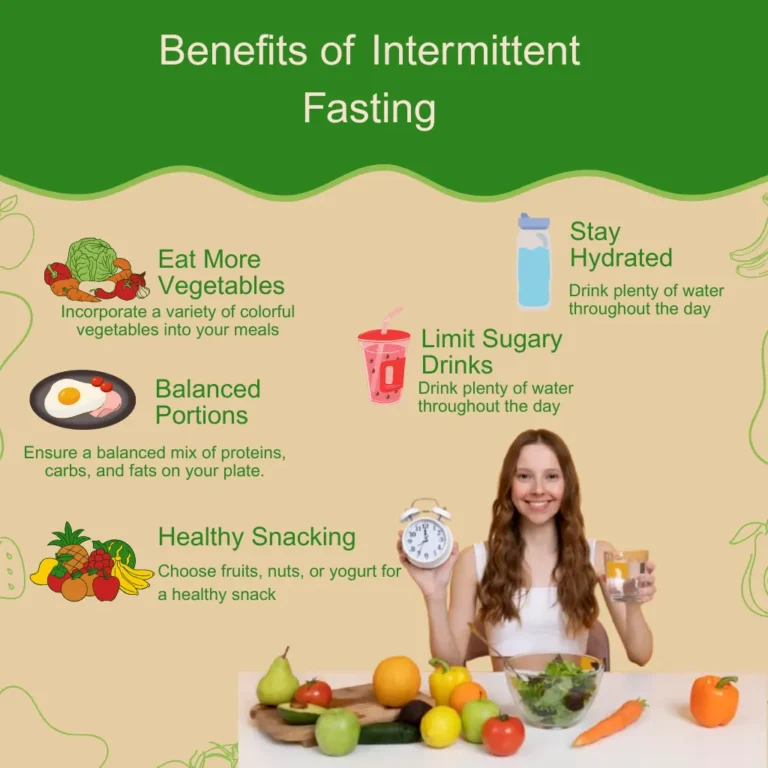Benefits of Intermittent Fasting – A Simple Yet Powerful Guide
Introduction:
Have you ever felt tired even after eating three full meals a day? Or struggled with weight gain, low energy, or brain fog? The solution might not be another diet, pill, or supplement. It could be something much simpler: Intermittent Fasting.Intermittent fasting is not a fad. It is a time-tested lifestyle practice with real, science-backed benefits for your body and mind. In Ayurveda and modern medicine alike, fasting has been used for centuries to detox, heal, and rejuvenate the body. This blog will explain the benefits of intermittent fasting in a way that even a 5th-grade student can understand. We’ll cover everything: what it is, how it works, why it helps, who should do it, and how to start safely.
Let’s discover how something as natural as not eating for a few hours can change your life for the better.
What is Intermittent Fasting?
Intermittent Fasting (IF) means choosing a time window each day (or week) when you eat, and fasting during the rest. Unlike diets, it doesn’t focus on what you eat, but when you eat.
Common Types of Intermittent Fasting:
| Method | Eating Window | Fasting Period | Notes |
|---|---|---|---|
| 16:8 | 8 hours | 16 hours | Most popular and easy to follow |
| 14:10 | 10 hours | 14 hours | Great for beginners |
| 5:2 | Normal eating 5 days | 500-600 calories on 2 non-consecutive days | Good for weight loss |
| 24-Hour | Eat once daily | Fast for 24 hours | For advanced practitioners only |
1. Supports Natural Weight Loss
When you fast, your body runs out of quick energy (from food) and begins to burn stored fat for fuel. This is called metabolic switching.
- Your insulin levels go down
- Fat-burning hormones increase
- Your metabolism gets a natural boost
Example:
Think of your body as a fuel tank. Eating all day keeps adding fuel. But fasting gives your engine time to use that fuel, especially the stored fat in your belly, thighs, and arms.
2. Regulates Blood Sugar and Insulin Levels
For people with Type 2 Diabetes or insulin resistance, intermittent fasting helps lower blood sugar naturally.
- Improves insulin sensitivity
- Reduces blood sugar spikes after meals
- May reduce need for diabetes medication
Always consult your doctor before starting IF if you have diabetes or take insulin.
3. Boosts Brain Health and Focus
Fasting increases levels of BDNF (Brain-Derived Neurotrophic Factor), which helps:
- Grow new brain cells
- Improve learning and memory
- Reduce the risk of Alzheimer’s and dementia
You’ll notice better focus, sharper thinking, and improved mood.
4. Reduces Inflammation
Inflammation is your body’s way of fighting harm, but too much of it causes problems.
Fasting:
- Reduces inflammatory markers in the blood
- Lowers joint pain and stiffness
- Helps in skin conditions like acne, eczema
5. Triggers Autophagy: Natural Detox
Autophagy is your body’s way of cleaning out old, damaged cells and making new ones. It’s like your body doing housekeeping.
- Prevents aging
- Removes toxins and waste
- May reduce cancer risk
Fasting is the most powerful way to boost autophagy without medicines.
6. Improves Heart Health
Heart disease is the world’s number one killer. Intermittent fasting improves many heart-related markers:
- Lowers LDL (bad cholesterol)
- Reduces triglycerides
- Controls blood pressure
This reduces your risk of heart attacks, strokes, and other cardiovascular problems.
7. Enhances Digestion
Fasting gives your digestive system a well-deserved rest. Constant eating can overwork your stomach.
- Reduces bloating and gas
- Improves gut health
- Helps with acid reflux and IBS
8. Extends Lifespan and Slows Aging
Animal studies show that fasting extends lifespan. While human research is ongoing, the early signs are promising.
- Slows down aging processes
- Reduces risk of age-related diseases
- Keeps you active and healthy for longer
9. Supports Hormonal Balance
Fasting impacts hormones that control hunger and fat storage:
- Ghrelin: The hunger hormone, becomes more balanced
- Leptin: The fullness hormone, becomes more effective
- Growth Hormone: Increases naturally, supports fat loss and muscle repair
10. Simple, Natural, and Free!
You don’t need pills, fancy juices, or diet plans. Just give your body time to rest from food.
- Saves money
- Easy to follow
- Works with any diet
Intermittent Fasting and Ayurveda
In Ayurveda, fasting is called “Upavasa”. It’s used to clear toxins (Ama), improve digestion (Agni), and balance the three doshas (Vata, Pitta, and Kapha).
Ayurvedic Benefits:
- Clears toxins from liver and intestines
- Sharpens mental clarity
- Calms the mind
- Promotes spiritual awareness
Many Ayurvedic practitioners recommend fasting once a week, especially on Ekadashi.
How to Start Intermittent Fasting
Step-by-Step Plan:
- Start with 12:12 (12 hours eat, 12 hours fast)
- Gradually move to 14:10 or 16:8
- Drink plenty of water, herbal teas, or lemon water
- Don’t overeat during the eating window
- Break your fast gently with fruits or light meals
Do’s and Don’ts:
| Do | Don’t |
| Stay hydrated | Eat junk food after fasting |
| Listen to your body | Ignore dizziness or weakness |
| Get good sleep | Skip meals randomly |
Who Should Avoid Intermittent Fasting?
Fasting is not for everyone. Avoid if you are:
- Pregnant or breastfeeding
- Underweight or recovering from illness
- A child or teenager
- Diabetic on medication (consult doctor)
Real-Life Success Story
Meena, 42, tried 16:8 intermittent fasting with her husband for 3 months:
“I used to feel tired and bloated every day. Now, I have more energy, lost 7 kilos, and my skin glows. My husband’s sugar levels dropped too!”
Real stories show real results.
Key Takeaways
| Benefit | What It Means |
| Weight Loss | Burns fat naturally |
| Better Digestion | Less bloating, more energy |
| Brain Boost | Clearer focus and memory |
| Heart Health | Lowers BP, cholesterol |
| Detox | Boosts body’s cleaning system |
| Free | No cost, no medicine |
Frequently Asked Questions (FAQs)
Q1. Can I drink water during fasting?
Yes, water, black coffee, and herbal teas are allowed.
Q2. What if I feel hungry?
It’s normal at first. Your body will adjust in 3-5 days.
Q3. Can I exercise during fasting?
Yes, but keep it light like walking or yoga in the beginning.
Q4. Will fasting slow down my metabolism?
No, short-term fasting actually boosts metabolism.
Q5. Is it a long-term solution?
Yes, many people make it a permanent part of their life.
Final Thoughts
Intermittent fasting is not about starving yourself. It’s about giving your body time to rest, recover, and heal.
It is simple, powerful, and backed by both modern science and ancient Ayurveda. Whether your goal is to lose weight, improve health, or feel more energetic, intermittent fasting could be the answer.
You don’t need to change everything overnight. Just take the first step.
Are you ready to try intermittent fasting and feel the difference?


